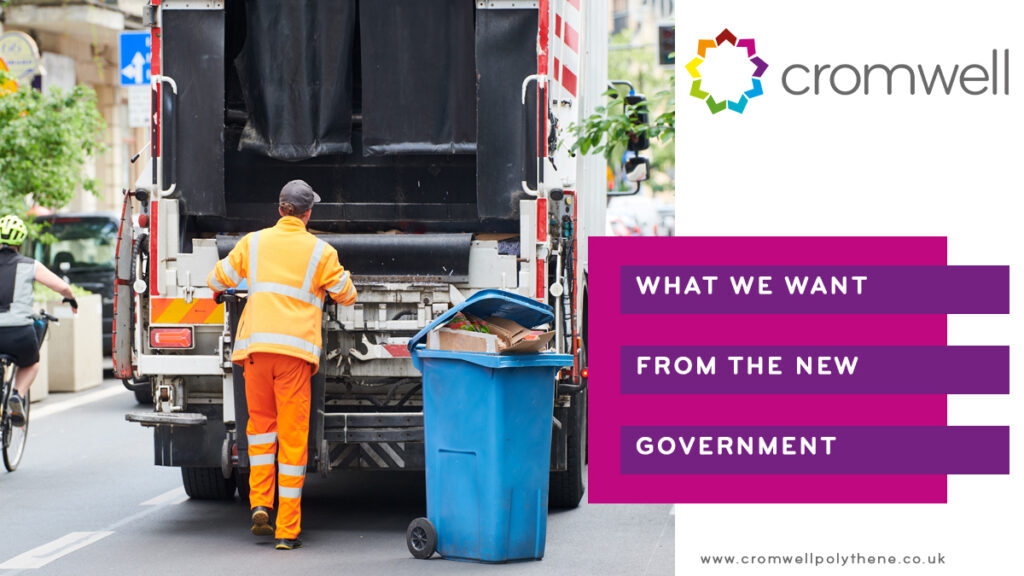On July 4th, the UK Voted in their hundreds of thousands, resulting in Labour Leader, Keir Starmer being elected as the Prime Minister, replacing the Conservative’s Rishi Sunak. Now not only do we have a new head of the government, we also have a new governing party in charge, for the first time in 14 years as Labour regained power. The industry is eager for further insight into the government’s plans for changes in the packaging, waste and recycling sector.
Simpler Recycling & Other Reforms
Some of the scheduled waste and packaging reforms were announced almost 6 years ago, when the Resources and Waste Strategy was published in December 2018. This included announcing Extended Producer Responsibility (EPR) and Deposit Return Schemes (DRS). You may remember that both of these new strategies were set to be implemented in 2023 – and yet, here we are half way into 2024, and little movement has been made since the initial announcement. On August 5th, it was announced that ‘The new Labour government has committed to delivering the UK’s deposit return scheme by October 2027’. The scheme aims to collect over 85% of returnable drink containers once it is in operation. Simpler Recycling (formerly known as, the Consistency of Collection scheme, seems to be making slow, but positive movements to being implemented, but will this also come to a grinding halt?

Simpler Recycling, scheduled to start in 2026 for households and 2027 for businesses, mandates weekly food waste collections across the UK. Many in the waste and recycling sector are keen to see this new scheme stay on track and be successfully implemented, making collections easier and hassle-free for both households and businesses. The GOV.UK website describes Simpler Recycling as “a new, simpler common-sense approach to recycling,” enabling people across England to recycle the same materials whether at home, work, or school, thus eliminating confusion about what can and can’t be recycled in different regions. We believe this reform is crucial to achieving a 65% municipal recycling rate by 2035, as outlined in the Circular Economy package.
Better Funding
With the increasing focus on a circular economy, funding will play a crucial role in the waste industry, a key component in the journey towards a more sustainable planet. Specifically, funding for enhanced recycling facilities will significantly contribute to achieving the recycling rate goals set for 2035. This could involve upgrading existing sites or establishing new ones to expand the UK’s recycling capacity, thereby boosting the effectiveness of waste collection.
Additionally, funding could support the implementation of the Simpler Recycling reform. This might include providing bins, developing the necessary infrastructure for the new waste collection systems, and conducting marketing campaigns to ensure its successful rollout. There are numerous ways in which funding can benefit the industry, with limitless opportunities for improvement. However, all these advancements are essential for achieving the overarching goal of a more sustainable plane
Improved Knowledge
In addition to funding and advancing reforms, the new government can prioritise educating everyone on best practices in waste management. Education is key to success, and by enhancing public knowledge about the problems caused by poor waste management, the significance of recycling, and the dangers we face if these issues are not addressed, we can move towards a more circular economy.
Improving waste management education in schools will help instil good habits in children as they grow, enabling them to bring these lessons home and implement them in their households. Expanding adults’ understanding of recycling, waste collection, and reuse will also be highly beneficial. While increasing the number of recycling outlets is a positive step, it is crucial that the public is aware of their existence to utilise them effectively. For instance, promoting soft plastic recycling hubs in supermarkets can encourage more people to use these facilities.
The more we know, the better we will be. Any guidance, advice, or reinforced messages on best practices from the government will be immensely helpful in this endeavour.